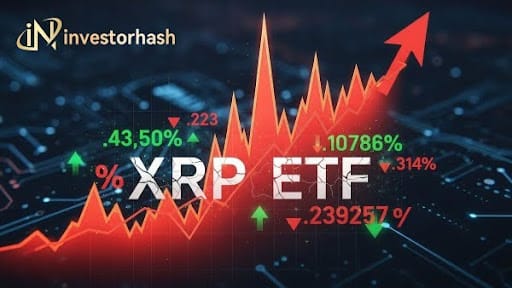South Korean Democratic Party Forms Digital Asset Committee To Address Regulatory Concerns

South Korea's largest political party, the Democratic Party, has launched a Digital Asset Committee focused on developing cryptocurrency policies and promoting industry growth. The committee held its inaugural meeting at the National Assembly Members' Hall in Seoul on May 13, as reported by Cointelegraph. During this first meeting, the committee emphasized resolving regulatory uncertainty and addressing key issues like stablecoin regulation amid increasing US-dollar stablecoin influence.
This new committee joins other regulatory bodies in South Korea's cryptocurrency landscape, including the Virtual Asset Committee launched by the Financial Services Commission (FSC) in late 2024 and an earlier public-private crypto task force established in 2022.
Leadership Structure and Exchange Participation
The Digital Asset Committee features prominent South Korean officials, with National Assembly Chairman Min Byeong-deok serving as committee chairman. Other key members include standing general election committee Chairman Yoon Yeo-joon, Muksanism Committee Chairman Maeng Seong-gyu, National Assembly member Kim Byeong-gi, and former National Assembly Chairman Kim Jeong-woo.
According to ChosunBiz, the committee will also involve executives from major local cryptocurrency exchanges, including Upbit, Bithumb, Coinbit, and Gopax. This integration of private sector expertise signals the committee's intention to incorporate industry perspectives into policy development.
Critical Regulatory Issues Under Consideration
At the inaugural meeting, Chairman Min highlighted concerns about South Korea's current "one-exchange-one-bank" rule, which restricts cryptocurrency exchanges to partnerships with only a single banking institution. "There are clear shortcomings to the one exchange, one bank principle," Min stated, noting that the committee is actively working with regulators to address this limitation.
The chairman also identified ongoing discussions regarding stablecoin regulation, including which regulatory body should oversee the stablecoin industry—the Bank of Korea or the FSC—and whether stablecoins should operate under a licensing or reporting system. This discussion comes shortly after Bank of Korea executive Koh Kyung-chul expressed concerns about Korean won-backed stablecoins at a May 12 conference, stating: "Stablecoin has a great impact on the implementation of central bank policies such as monetary policy, financial stability, and payment settlement."
South Korea's Evolving Cryptocurrency Regulatory Framework
This committee formation represents another step in South Korea's comprehensive approach to cryptocurrency regulation. In July 2024, the country implemented its first major cryptocurrency framework, the Act on the Protection of Virtual Asset Users (VAUPA), which imposed stricter requirements on exchanges, including mandating that service providers safekeep at least 80% of user crypto deposits in cold storage separate from their own funds, as reported by The Block.
The Financial Services Commission plans to introduce a second phase of cryptocurrency regulations in the latter half of 2025, focusing on standardizing crypto token issuance procedures and enhancing information disclosure practices for investors, according to Coinspeaker. This upcoming framework aims to take a comprehensive approach encompassing service providers, crypto users, and the broader market.
Political Context And Upcoming Elections
The committee's formation comes at a significant time in South Korean politics, with a snap presidential election scheduled for June 3, 2025, following the impeachment and removal of former President Yoon Suk Yeol. The Democratic Party, which established this Digital Asset Committee, has nominated Lee Jae-myung as its presidential candidate and currently leads in polls with approximately 41% support compared to the People Power Party's 35%, according to Brookings Institution.
Digital assets have become an increasingly important political issue in South Korea. The ruling People Power Party (PPP) has made its own pro-cryptocurrency promises, including pledges to eliminate the one-exchange-one-bank rule, launch corporate crypto trading before the end of 2025, and approve cryptocurrency ETFs, as reported by Cryptonews.
Global Implications for Cryptocurrency Markets
South Korea's active development of cryptocurrency regulation places it among the more progressive nations in the Global Bitcoin Policy Index (GBPI), which ranks the country 13th globally with a score of 69.0 out of 100. According to this index, South Korea scores particularly well in regulatory framework (78/100) but faces challenges in tax treatment (60/100) and government adoption (65/100).
The country's regulatory evolution will likely influence other Asian markets as they develop their own cryptocurrency frameworks. South Korea's approach balances innovation with consumer protection through comprehensive licensing regimes and clear guidelines for different types of crypto assets.
For the global cryptocurrency ecosystem, South Korea's regulatory developments may serve as a model for balancing security concerns with the need to foster technological advancement. The participation of major exchanges in this new committee suggests a collaborative approach between government and industry stakeholders.
Related Reading on BTC Peers
Global Bitcoin Policy Index (GBPI)
Read this article to gain comprehensive insights into how different countries approach Bitcoin regulation. The Global Bitcoin Policy Index evaluates 35 nations on factors including legal status, tax treatment, regulatory frameworks, government adoption, and innovation support. You'll discover which countries offer the most favorable environments for cryptocurrency development and how South Korea compares to global leaders like El Salvador, Switzerland and Singapore.




